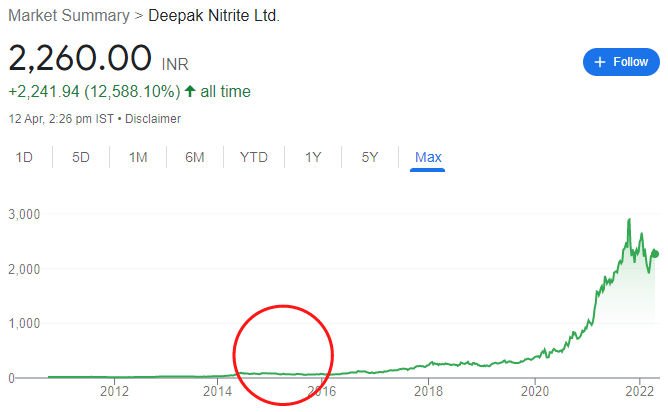The cricketing season this year is on again beginning with IPL. We are here to make financial sense from the entire IPL season. At the end of the day, even the IPL is about business, finance, and money.
All the franchises try to create a strong portfolio of cricketers with a combination of Indian and overseas players. These include experienced and uncapped players, batters, allrounders, and bowlers. The end goal of each of the franchisees is to build a solid team, which would flourish over the next few years. There is a scouting department responsible for extensive research and identifying young and raw talent (like small cap stocks – yet to become success stories) from the local teams.
This may seem a little counter intuitive at first but let us draw parallels between the ‘World of IPL’ and the ‘World of Investments and Finance.’
1. The right retention tactic – Ride your winners
The most successful franchisee like Chennai Super Kings (CSK) and Mumbai Indians (MI) have accurate and effective with the players that they have retained just before the Mega auction. It is important to retain successful players who have contributed to your team’s success. CSK and MI have always had their core group of players playing consistently. So, it was easier for them to transition to the Mega auctions.
Similarly, in the stock markets, it is especially important to hold onto your winners (the stocks that are profitable) and cut off the losses as quickly as possible.
2. Assess external conditions – Do your homework. Understand the macro-economic factors impacting the market
As the captain of the team evaluates the weather conditions, pitch report, and the outfield dynamics before the match, it is especially important for you to study and understand the macro-economic factors impacting the stock market.
These factors may be completely out of control like moisture, and dew on the field. These external factors usually bother the bowling team going second. The captain, therefore, must assess the situation, decide during the toss, and fix the combination of the playing eleven.
Similarly, as an investor, you must understand the impact of macro factors such as the Russia-Ukraine invasion, effect of change in interest rates, change in oil prices, etc. You may not be able control them but knowing the impact of these external factors on your investment, may be critical to identifying the right opportunities and selecting the right stocks.
3. Scout for young and promising players – Research extensively
As important as it is identifying the core group of players, it is equally vital for you to invest in new talent. Scouting and searching for fresh players has been a top priority for most franchisee. Hardik Pandya and Jasprit Bumrah, you see today, are players the Mumbai Indians scouted.
The franchisee invested in them from 2013 to 2015 to make them what you see today. These are jewels that performed exceedingly well because they could hone their potential. Such investments have helped the Mumbai Indians win four IPL titles in 6 years between 2015 and 2020.
Similarly, you must research extensively for potential investment themes and the companies that can do well in the identified theme. When there are few investing in potential small cap stocks, that’s the time, it has the maximum potential for value creation. Historically, small caps have generated alpha in the long term and outperformed other segments. It is good to have these promising future stars in the mix of your portfolio to generate alpha.
4. Have a balanced team with leaders and promising players – Diversify your risks
Talking about the few hard hitters like Hardik Pandya, who can win you games at the most crucial moments in the tournament, it is also equally important to have stable and experienced players like Rohit Sharma in the team. Cricketers like Rohit Sharma can consistently deliver good performances that can win you matches.
Most successful IPL teams like MI and CSK have the best combination of both experienced players and young talent. The franchisees have batters, bowlers, all-rounders, and a sound experienced attack of overseas players. When you tick all these boxes, you have created a balanced team.
Likewise, your ideal portfolio must have a mix of blue-chip stocks, promising small and mid-cap stocks, growth vs value stocks, dividend stocks, with good sectoral allocation. Sound stock selection and allocation strategy help you diversify your portfolio and mitigate potential risks.
Cricket and investment are all about teamwork where all the stocks must contribute to generate the alpha returns.
5. Strategic time out – Portfolio review at regular intervals
There are two strategic breaks in each inning of the IPL. The coach and the support staff play a particularly vital role to assess the situation. They also devise a plan forward for the team to achieve the target.
When the team realizes that they are far behind on their plan in the first part of innings, the team management and the captain can decide to change the dynamics of the game in their favor.
Similarly, it is important for you to review and evaluate the performance of the stocks in your portfolio. Even for a long-term portfolio, you must at least review your portfolio once a quarter to see whether the assumptions and the market dynamics still hold for your investments.
The IPL players feel the need to take breaks and assess the situation twice in a twenty over game, which lasts just less than 2 hours. If you are planning your life for the next 20 years, don’t you think it is vital to review your decisions at regular intervals?
Think about it!
6. Form Is Temporary, Class Is Permanent – Have Patience
This is one of the most important lessons to learn from IPL.
Fans and franchisees have grand expectations from their favored players. They want these players to perform well in every match. But that isn’t possible.
Cricketers, like other athletes, have good and bad phases.
Take Rohit Sharma from MI for instance. It’s been over a decade that Sharma is with the same franchise.In certain seasons, he kept winning the orange cap with the maximum number of runs under his belt. But he faltered in other seasons.
However, the franchise has continued to keep faith in him. They haven’t forced him out of captaincy. Despite his ordinary performances in the last few IPLs, he retained the captain’s spot for Mumbai Indians in this year’s mega auction.
The reason is simple – Mumbai Indians are aware that form is temporary, and class is permanent
Similarly, you may be in a situation where a stock from your portfolio has performed exceedingly well in the past but is underperforming of late. This doesn’t imply that this stock wouldn’t grow in the future, provided business fundamentals are intact.
If you have researched extensively about the stock and believe in its potential, then you must be patient.
Don’t get disappointed by underperformance as the turnaround may just be around the corner.

Look at Deepak Nitrite for instance. The stock delivered multibagger gains in the last two years. However, the stock listed in 2010. Before picking pace in 2016, Deepak Nitrite was range-bound between 2014 and 2016.
7. Work with a good coach – Seek help from financial advisor
It is okay to not know everything. All IPL franchisees i.e., MI, CSK, Rajasthan Royals, have a different head coach, batting coach, bowling coach and fielding coach. They have as many members in the coaching staff as the number of players or more.
You may wonder why a player like Rohit Sharma, Virat Kohli, or any other player of their stature would need a coach?
Well, they perform exceedingly well at the highest level of cricket and have reached the epitome of success. But they weren’t that big when they first began. They may have been exceptional players, but they needed guidance too. Seeking guidance and help from an external coach to improve performance and hone their talents has worked wonders for them.
Likewise, you may consider seeking help from a professional investment advisor. A financial advisor may be able to guide you better on your financial goals and wealth creation.
If you think that identifying stocks and sectors is not your cup of tea, you have come to the right place. Subscribe to our 5 in 5 Wealth Creation Strategy and let us help you build a fortune from right equity investments.
Read more: About Research and Ranking.
How useful was this post?
Click on a star to rate it!
Average rating 0 / 5. Vote count: 0
No votes so far! Be the first to rate this post.

